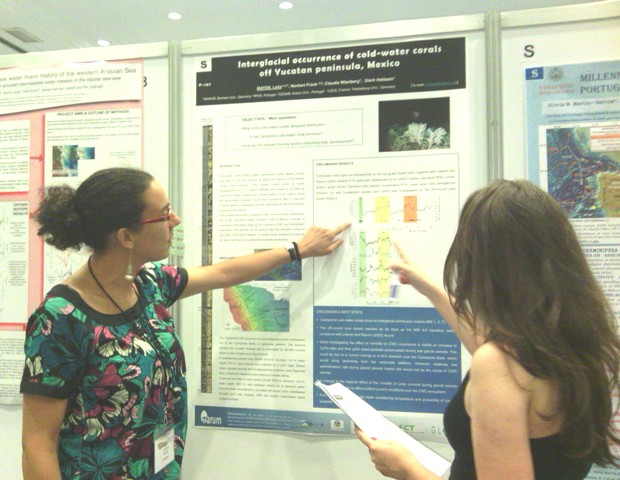Page path:
Lélia Matos
Report of GLOMAR PhD student Lélia Matos about her participation in the International Conference on Paleoceanography, Barcelona, Spain, 1 – 6 September 2013
The 11th International Conference on Paleoceanography (ICP) took place in Sitges, Barcelona, from 1 - 6 September, 2013. The venue was held at the large auditorium of the Meliá Hotel, comfortably hosting the nearly 600 registered participants. The ICP meetings are taking place since 1983, once every three years. The previous meetings were held all over the globe, from Europe to USA (1986, 2010) and Canada (1995), or even Japan (2001) and China (2007). All of those have been exceptional events for presenting the latest achievements from the vast and multi-disciplinary themes on Paleoceanography. While generally addressing Ocean and Climate issues, the ICP meetings are also given a special focus on the most relevant paleoceanographic topics as they evolve through time. This year, under the title “Long-term perspectives on ocean and climate dynamics – Three decades of ICP” the meeting was mainly focused on five themes organized in five sessions: 1) Reading the paleo-record: From proxy development to application; 2) Extending the instrumental record into the paleo-world; 3) Dynamics of the ancient non-analogue oceans; 4) Ocean biogeochemistry and ecosystems; 5) Continent-ocean interactions. The sessions were organised in plenary sessions and oral presentations given by invited speakers and happening mostly in the mornings, followed by extensive poster sessions in the afternoons.
The presentation of my poster untitled “Interglacial occurrence of cold-water corals off Yucatan peninsula, Mexico” took place on Monday, September 2nd, as part of the first Session. During my poster presentation, and later during the remaining poster sessions, I had the opportunity of thoroughly discuss some of my PhD results. I believe that such interactions are important brainstorming moments that will later enrich my future PhD manuscripts.
Following the tradition set by previous ICPs various social events supplemented the meeting, including the famous Catalan Castells entertainment during the Ice-breaker and the traditional Paleomusicology concert given by some of the participating scientist.
Participating in the ICP allowed me to strengthen my scientific network; learn about the latest achievements of the ocean/climate research field; and improve my own research. I am very grateful to GLOMAR whose financial support allowed me to participate in this meeting.
The presentation of my poster untitled “Interglacial occurrence of cold-water corals off Yucatan peninsula, Mexico” took place on Monday, September 2nd, as part of the first Session. During my poster presentation, and later during the remaining poster sessions, I had the opportunity of thoroughly discuss some of my PhD results. I believe that such interactions are important brainstorming moments that will later enrich my future PhD manuscripts.
Following the tradition set by previous ICPs various social events supplemented the meeting, including the famous Catalan Castells entertainment during the Ice-breaker and the traditional Paleomusicology concert given by some of the participating scientist.
Participating in the ICP allowed me to strengthen my scientific network; learn about the latest achievements of the ocean/climate research field; and improve my own research. I am very grateful to GLOMAR whose financial support allowed me to participate in this meeting.



